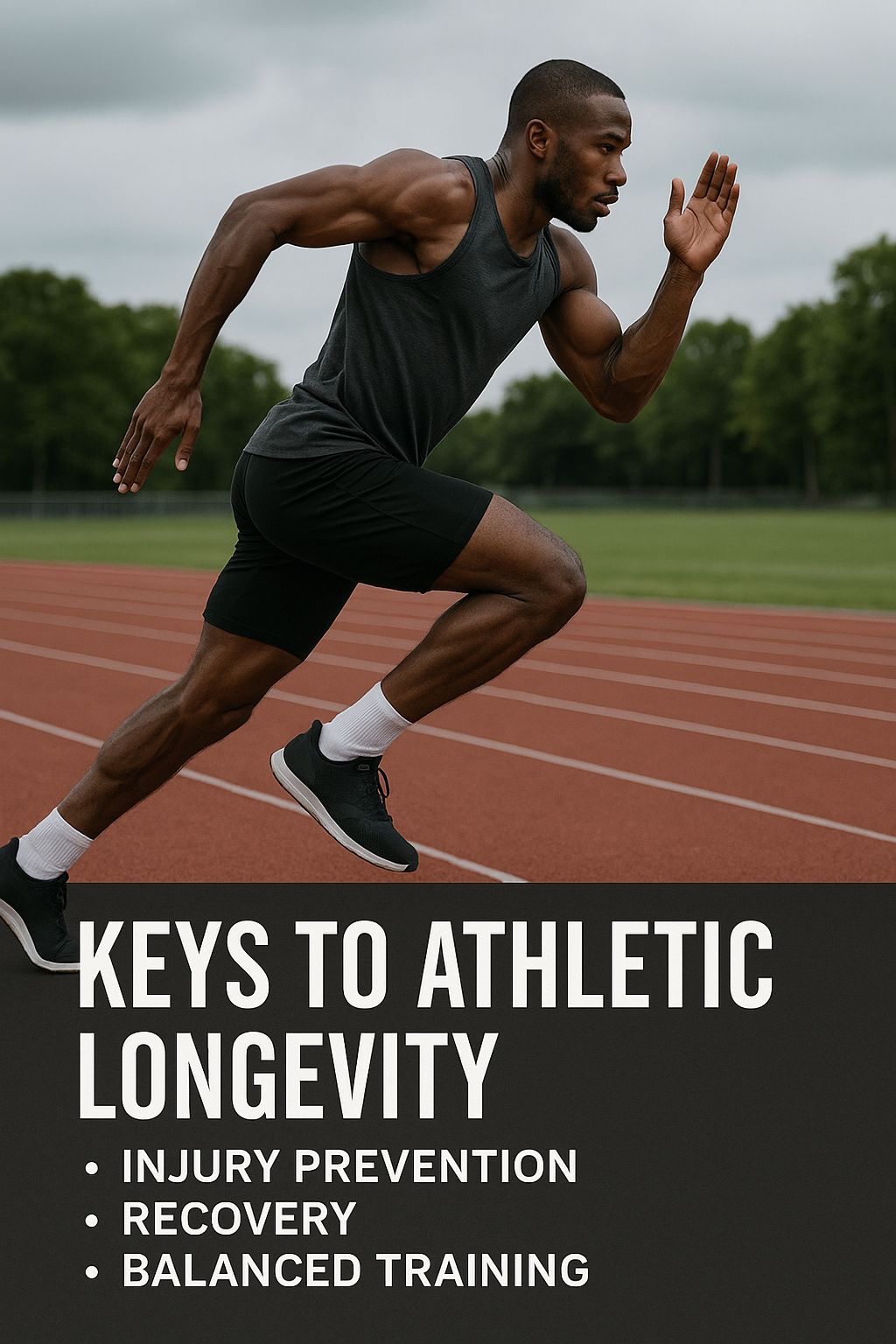
The Secret to a Long Athletic Career? It’s Not Just About Training Harder
Why the Next Generation of Smart Athletes Is Training for Longevity, Not Just Wins
We all love the highlight moments — the winning goal, the record-breaking sprint, the perfect
finish. But behind every major athletic success is a story of strategy, resilience, and most
importantly… sustainability.
Longevity in sport isn’t just about winning today.
It’s about building a body and mind that can keep showing up — season after season, year after
year.
In today’s high-pressure performance culture, athletes are starting to ask a bigger question:
“How can I stay in the game — at a high level — for as long as possible?”
Here’s what the research (and top performers) are showing us.
⸻
- Recovery Is Where Progress Happens
Let’s start with the biggest misconception in athletic culture:
More training = more progress.
The truth?
Recovery is when you get stronger.
Training is just the stimulus.
Every sprint, lift, or drill creates micro-damage in your muscles, nervous system, and connective
tissues. Without proper recovery, those stressors add up — leading to:
- Decreased performance
- Increased inflammation
- Injury and burnout
- Shortened careers
Smart recovery strategies include: - Deep, consistent sleep (7–9 hours minimum)
- Hydration & nutrient timing post-workout
- Active recovery like light cardio, walking, and mobility work
- Stress management to lower cortisol and improve tissue repair
Athletes who prioritize recovery don’t fall behind — they actually stay ahead.
⸻
- Longevity Is a Daily Commitment, Not a One-Time Fix
It’s easy to focus on recovery only after something goes wrong — a tight hamstring, nagging
shoulder, or sudden drop in performance.
But true longevity is about prevention, not reaction.
Like brushing your teeth or warming up your car, daily habits matter more than occasional
effort. These micro-decisions compound over time.
Daily longevity boosters:
- Joint mobility and soft tissue work (foam rolling, banded stretching)
- Quality nutrition, rich in antioxidants, omega-3s, and micronutrients
- Cold/heat therapy to manage inflammation when needed
- Mindful breathing or meditation, reducing nervous system overload
It’s not glamorous. But it’s what keeps athletes on the field while others sit on the
sidelines.
⸻
- Personalization Is No Longer Optional
Gone are the days of “one-size-fits-all” training plans.
Every athlete has a unique combination of genetics, sport demands, biomechanics, recovery
speed, and mental load. A program that works for one person might burn another out in a month.
Thanks to wearable tech, sport science, and evolving research, training smarter is now easier
than ever.
What personalized performance looks like:
- Tracking HRV, sleep, and training load to adjust daily effort
- Customized recovery protocols based on muscle soreness or CNS fatigue
- Biomechanical analysis to correct movement patterns and prevent injury
- Functional bloodwork to identify nutrient gaps, hormonal imbalances, and
inflammation levels
The result? Fewer injuries. More energy. Longer careers.
⸻
- The Mental Game Is the Hidden Edge
Longevity isn’t just about keeping your body strong.
It’s about keeping your purpose and passion alive.
Too many athletes struggle with:
- Burnout from constant competition
- Pressure from coaches, fans, or social media
- Identity loss when performance dips or injuries happen
If physical strength is the engine, mindset is the steering wheel.
Athletes who cultivate mental resilience are the ones who recover faster, bounce
back from failure, and keep evolving with their sport.
Ways to build mental longevity: - Work with a sports psychologist or mindset coach
- Journal or reflect regularly to process pressure and emotions
- Take strategic breaks to reset motivation
- Connect with your “why” beyond just medals or contracts
Mental wellness isn’t a weakness — it’s a competitive advantage.
⸻
- Fueling for the Long Run
What you eat doesn’t just affect your performance today — it determines your tissue quality,
hormone balance, energy, and recovery ability over the long term.
Fad diets may offer short-term wins. But for longevity, sustainable, anti-inflammatory nutrition
is key.
Essentials for athlete longevity:
- Protein to support muscle repair and hormonal health
- Healthy fats (especially omega-3s) to protect joints and brain
- Complex carbs for energy and recovery
- Colorful, whole foods rich in vitamins and antioxidants
- Supplementation only when gaps are proven by data
Fueling your body with intention keeps it performing — and healing — year after
year.
⸻
Final Thought: Longevity Is the New Measure of Greatness
The athletes who rise — and stay — at the top are no longer just the most explosive or genetically
gifted.
They are the ones who:
Recover smart
Train with purpose
Adapt their plan as they age
Listen to their bodies
Protect their mind as fiercely as their body
At Athlete Longevity, we’re here to help you play the long game.
Through science-backed insights, expert advice, and real-world strategies, we empower you to
perform better — not just now, but for the long haul.
Because true greatness isn’t just measured in moments.
It’s measured in seasons.

